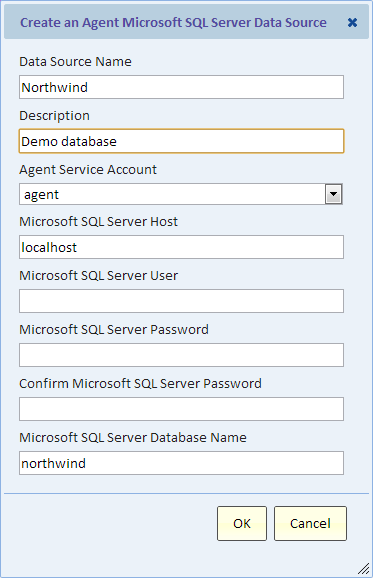Difference between revisions of "Configuring a SQL Server Data Source"
Gadiyedwab (talk | contribs) |
Gadiyedwab (talk | contribs) |
||
| Line 9: | Line 9: | ||
== Creating the Data Source == | == Creating the Data Source == | ||
| − | To create the data source, go to the "Data" menu and select the option "Add a | + | To create the data source, go to the "Data" menu and select the option "Add a new data source", and then select "Microsoft SQL Server". You will see the following dialog (we show it with some example inputs already populated). We then explain each entry. |
[[File:add_sql_server_data_source.png]] | [[File:add_sql_server_data_source.png]] | ||
| Line 39: | Line 39: | ||
=== Microsoft SQL Server Database Name === | === Microsoft SQL Server Database Name === | ||
| − | Your SQL Server manages several "databases" each one has a database name (this is SQL Server terminology). The data source is for one such database. Please specify the name of the database (in our example it "northwind", the SQL Server example database). | + | Your SQL Server manages several "databases" each one has a database name (this is SQL Server terminology). The data source is for one such database. Please specify the name of the database (in our example it "northwind", the SQL Server example database). |
== Getting Help == | == Getting Help == | ||
Revision as of 13:46, 23 October 2013
Contents
Overview
Explore Analytics assumes that your SQL Server database is in your private network and therefore requires the Explore Analytics Agent to be deployed before setting up a SQL Server data source. Please see the section Installing the Explore Analytics Agent for installation instructions.
The agent should be installed on a Windows computer that has access to the database. For example, you may install it on the computer that hosts the SQL Server database.
The rest of this page assumes that you have the agent installed and running. You're now ready to setup a SQL Server data source and create live reports that draw data directly from your database.
Creating the Data Source
To create the data source, go to the "Data" menu and select the option "Add a new data source", and then select "Microsoft SQL Server". You will see the following dialog (we show it with some example inputs already populated). We then explain each entry.
Data Source Name
Give this data source a name that would identify it.
Description
Optional description. This is shown when you list data sources to help users choose the correct data source.
Agent Service Account
The choices for this field are typically pre-populated for you, and there's usually only one choice. This is the name of the Explore Analytics account through which the agent connects to Explore Analytics. You will need to make a selection here only if you have multiple agents that service different data sources.
Microsoft SQL Server Host
This is the host name (computer name) of the computer on which SQL Server resides. If the agent is installed on the same computer as the database, then you can typically refer to the host as "localhost" as in our example. If the database is on another computer, enter the name or IP address of that computer.
Microsoft SQL Server User
This is the name of the database user through which we connect to the database to access data. You can leave this field blank, to use "Integrated Security". That's a feature of SQL Server that identify the user based on their Windows user. Therefore, this would identify the database user to be the Windows account under which the agent is running (e.g., the local "administrator" account).
Microsoft SQL Server Password
The password of the user entered in the previous field. If you're using Integrated Security, then leave this field blank as well.
Microsoft SQL Server Database Name
Your SQL Server manages several "databases" each one has a database name (this is SQL Server terminology). The data source is for one such database. Please specify the name of the database (in our example it "northwind", the SQL Server example database).
Getting Help
Setting up an agent-based data source is the most difficult task in Explore Analytics. Don't hesitate to seek help. You can contact Explore Analytics Support.
